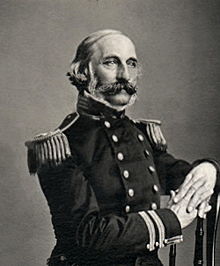Charles Henry Davis
Charles Henry Davis (born January 16, 1807 in Boston , Massachusetts , † February 18, 1877 in Washington, DC ) was an American naval officer ( admiral ), astronomer and hydrographer .
Life
Davis' father Daniel Davis was Solicitor General (about: senior legal counsel ) of Massachusetts, his mother Lois Freeman a sister of the Unitarian theologian James Freeman .
Charles Henry Davis studied at Harvard University from 1821 , but then became a midshipman in the US Navy in 1823 in order to continue to attend lectures, especially in mathematics, during breaks . In 1829 he became a Sailing Master (navigational officer with a rank just below that of the captain). In 1841 he was able to complete his Harvard studies. Davis carried out extensive surveys of the coasts of Massachusetts, Rhode Island and Maine for the United States Coast Survey from 1842 , including the confusing shallows around the island of Nantucket . He was a strong proponent of establishing the American Nautical Almanac (1849), which he was responsible for for several years. He wrote several scientific monographs . In 1854 Davis was promoted to commander .
During the American Civil War he was on the commission that recommended the construction of the ironclad USS Monitor . As a fleet captain in 1861 under Admiral Samuel Francis Du Pont, he was involved in the battles for the Hatteras Inlet Batteries and Port Royal as part of the naval blockade . Davis commanded the gunboat flotilla on the upper Mississippi River after the wounding of Commodore Andrew Hull Foote in 1862 and was able to contribute significantly to the conquest of Memphis , Tennessee (see Battle of Memphis ). In 1863 Davis became Rear Admiral . That same year he established the US Navy's Bureau of Navigation , which he headed for two years before taking over the management of the United States Naval Observatory . Davis headed a commission to monitor the transit of Venus in 1874 .
Honors and afterlife
Davis was elected to the American Academy of Arts and Sciences in 1842 and to the American Philosophical Society in 1852 . In 1863 he was one of the 50 founding members of the National Academy of Sciences .
The grave of Charles Henry Davis is in Cambridge Cemetery in Cambridge , Massachusetts. In Vicksburg National Military Park in Vicksburg , Mississippi , recalls a statue to him. His son Charles H. Davis was Chief Intelligence Officer of the Office of Naval Intelligence from 1889 to 1892 . He wrote an extensive obituary for his father for the National Academy of Sciences (see literature). Several United States Navy ships were named after him.
literature
- CH Davis: Charles Henry Davis, 1807-1877 (PDF, 1.6 MB). In: Biographical Memoirs of the National Academy of Sciences , 1896
- Olive Hoogenboom: Davis, Charles Henry. In: American National Biography . doi : 10.1093 / anb / 9780198606697.article.0500912
- Charles Henry Davis. In: Encyclopædia Britannica ( online )
Web links
- Charles Henry Davis in the database of Find a Grave (English)
Individual evidence
- ↑ Book of Members 1780 – present, Chapter D. (PDF; 575 kB) In: American Academy of Arts and Sciences (amacad.org). Retrieved January 13, 2018 .
- ^ Charles H. Davis. In: amphilsoc.org. American Philosophical Society , accessed January 13, 2019 .
- ^ Charles H. Davis. In: nasonline.org. National Academy of Sciences , accessed January 13, 2019 .
- ^ Incorporators of the NAS. In: nasonline.org. National Academy of Sciences , accessed January 13, 2019 .
- ^ Flag Officer Charles Henry Davis. In: nps.gov. National Park Service , accessed January 16, 2019 .
| personal data | |
|---|---|
| SURNAME | Davis, Charles Henry |
| BRIEF DESCRIPTION | American admiral, astronomer, and hydrogeographer |
| DATE OF BIRTH | January 16, 1807 |
| PLACE OF BIRTH | Boston , Massachusetts |
| DATE OF DEATH | February 18, 1877 |
| Place of death | Washington, DC |
